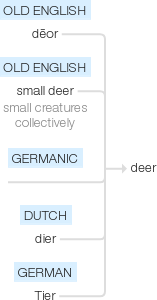Deer
Old English dēor, also originally denoting any quadruped, used in the (now archaic) phrase small deer meaning ‘small creatures collectively’; of Germanic origin; related to Dutch dier, German Tier .
wiktionary
From Middle English deere, dere, der, dier, deor(“small animal, deer”), from Old English dēor(“animal”), from Proto-West Germanic *deuʀ, from Proto-Germanic *deuzą, from Proto-Indo-European *dʰewsóm(“living thing”), from *dʰéws(“breath”), full-grade derivative of *dʰwes-.
Cognate with Scots dere, deir(“deer”), North Frisian dier(“animal, beast”), West Frisian dier(“animal, beast”), Dutch dier(“animal, beast”), German Low German Deer, Deert(“animal”), German Tier(“animal, beast”), Swedish djur(“animal, beast”), Norwegian dyr(“animal”), Icelandic dýr(“animal, beast”).
Related also to Albanian dash(“ram”) (possibly), Lithuanian daũsos(“upper air; heaven”), Lithuanian dùsti(“to sigh”), Russian душа́(dušá, “breath, spirit”), Lithuanian dvėsti(“to breathe, exhale”), Sanskrit ध्वंसति(dhvaṃsati, “he falls to dust”).
For the semantic development compare Latin animālis(“animal”), from anima(“breath, spirit”).
etymonline
deer (n.)
Old English deor "wild animal, beast, any wild quadruped," in early Middle English also used of ants and fish, from Proto-Germanic *deuzam, the general Germanic word for "animal" (as opposed to man), but often restricted to "wild animal" (source also of Old Frisian diar, Dutch dier, Old Norse dyr, Old High German tior, German Tier "animal," Gothic dius "wild animal," also see reindeer).
This is perhaps from PIE *dheusom "creature that breathes," from root *dheu- (1) "cloud, breath" (source also of Lithuanian dusti "gasp," dvėsti "gasp, perish;" Old Church Slavonic dychati "breathe"). For possible prehistoric sense development, compare Latin animal from anima "breath").
The sense specialization to a specific animal began in Old English (the usual Old English word for what we now call a deer was heorot; see hart), was common by 15c., and is now complete. It happened probably via hunting, deer being the favorite animal of the chase (compare Sanskrit mrga- "wild animal," used especially for "deer").
Deer-lick "salty spot where deer come to lick," is attested by 1778, in an American context. The deer-mouse (1840) is so called for its agility.
